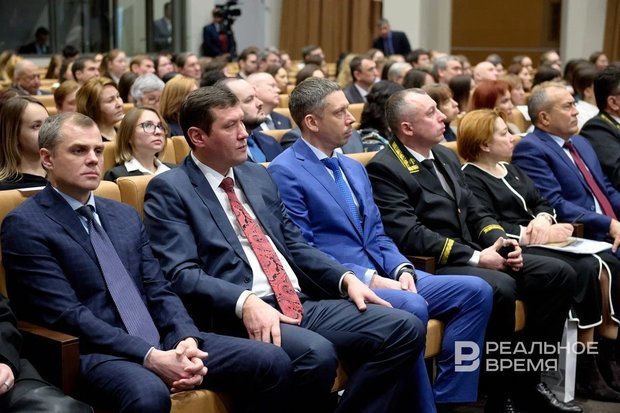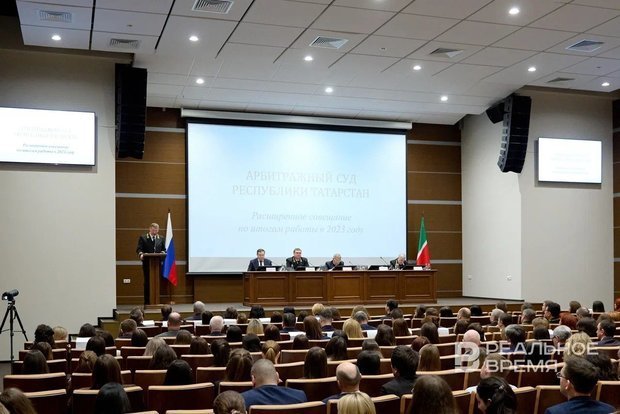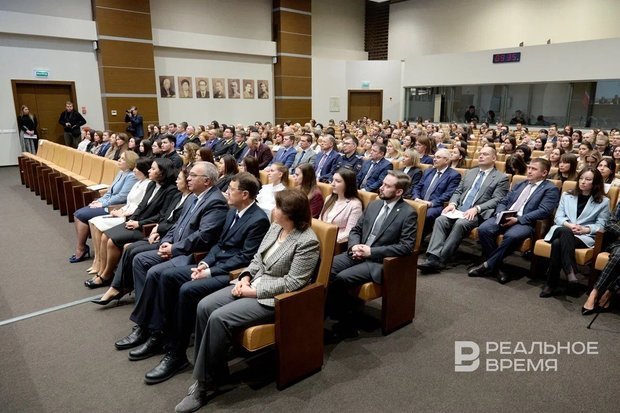Rustam Minnikhanov: ‘The increase in the number of bankrupt cases is a bad signal’
Judges of the Tatarstan Arbitration Court are urged to maintain a balance of public and private interests in insolvency disputes

The bankruptcy procedure should be carried out in such a way as to fulfill the debtor's obligations to the state and other creditors as much as possible, stressed the rais of Tatarstan, addressing the judges of the Arbitration Court of the Republic of Tatarstan. Speaking at the final board meeting of the department, he expressed concern about the growth of financial insolvency cases and thanked for the coordinated work in resolving disputes, including reducing tax arrears. At the meeting, they talked about the increased burden on the judges of the Tatarstan arbitration court and a noticeable decrease in the number of cancelled verdicts, as well as the number of disputes over contractual relations that increased along with the pace of construction, the correspondent of Realnoe Vremya who visited the board meeting noted.
More disputes with contractors and supply disruptions
Tatarstan arbitration employs 63 judges, the average total workload for each of them has increased significantly in recent years — up to 169 cases a month. The chairman of the court is Maxim Borovkov, whose six-year term of office expires in April, and he has already applied for a new term. Speaking on the results of the work, he noted the increase in the number of cases.
Last year, the Arbitration Court of the Republic of Tatarstan received over 37.5 thousand applications, or 5% more than a year earlier and 16% more than in 2021. The lion's share of lawsuits, more than 18 thousand — in economic cases (on the conclusion of contracts, invalidation, corporate disputes, protection of property rights, protection of intellectual property). Almost 6 thousand cases on the application of tax, budget, customs, and antimonopoly legislation were opened, and more than 11 thousand bankruptcy cases.

Besides, state programmes to support business entities introduced during the pandemic led to an increase in the number of certain categories of cases. The parties argued about whether they were subject to the terms of a particular support measure, for example, a deferral of lease payments or a moratorium on the accrual of penalties. As soon as the temporary ban on business inspections ceased to apply, the number of cases related to the application of tax legislation began to grow. As a result of the rupture of logistics chains and other economic ties in the face of Western sanctions pressure, there have been more economic disputes over the purchase, sale and supply of products.
“The increase in the pace of construction, including housing, has predictably increased the number of court cases arising from contractual relationships. A gradual increase in disputes arising from the construction contract is expected this year," Maxim Borovkov said.

“In terms of the number of appealed judicial acts, the Arbitration Court of Tatarstan ranks first”
According to the speaker, one of the tasks of economic justice is to assist the court in the extrajudicial settlement of the conflict. As an example, he cited cases when Tatarstan farmers are trying to deprive grant and other state support through the courts for various violations: “It is gratifying that in the reporting period a quarter of such disputes ended with the approval of a settlement agreement.”
Bankruptcy cases are a separate important part of the work of arbitration judges. In eight years, the share of such disputes in the total structure of claims has increased significantly: from 3.5% in 2016 to 27% in 2023. The number of bankruptcies of individuals has also increased (+14% by 2022). About 8 thousand Tatarstan citizens, in respect of whom the procedure for the sale of property was completed, were released from further fulfillment of obligations. At the same time, the head of the Tatarstan arbitration noted that citizens could not resort to the help of the court to declare themselves financially insolvent. He complained that the mechanism of out-of-court bankruptcy is still poorly used.

Borovkov also reported an expected increase in the number of cases of the collapse of legal entities after the lifting of the six-month moratorium on bankruptcy. The number of applications filed immediately increased by 73%, and the number of cases reviewed — by 27%.
Last year, 9.6 thousand of the total number of adopted judicial acts were appealed (in 2022 — 9.7 thousand). The courts of verification instances cancelled or changed 1,348 judicial acts.
“Against the background of an increase in the judicial burden on judges, the total number of cancelled or amended judicial acts decreases annually. A similar pattern is observed when analysing complaints received by the court against the actions of judges and our staff. The annual decrease in the number of complaints received and, most importantly, the decrease in complaints recognised as justified, cannot but indicate a positive trend," Maxim Borovkov noted.

Meanwhile, Oleg Likhomanenko, the acting chairman of the Eleventh Arbitration Court of Appeal, who spoke next, said that the number of appeals has been growing since 2020, including against decisions of Tatarstan judges. At the same time, there were traditionally more complaints against their verdicts than in other courts — 8237 or 42.3% of the total structure. For comparison, the proportion of complaints against judicial acts of Samara judges is 36.3%, Ulyanovsk — 15.9%, Penza — 8.5%.
“The largest percentage of complaints are received on judicial acts on disputes related to non-fulfillment or improper fulfillment of obligations under contracts — 32.3%, bankruptcy — 30.7%, application of legislation on administrative offenses — 6.5%, on land — 4.2%," Likhomanenko specified.
More than half a million cases have been considered in the Volga Arbitration over the past year. This is by 12% more than in 2022 and by 30% more than in 2021. Denis Plotnikov, the chairman of the Arbitration Court of the Volga Region, agreed that the performance of colleagues from the Tatarstan arbitration had indeed improved in recent years, but at the same time, noted another feature of Tatarstan:
“Despite that your court is not in the first place in terms of the number of cases and applications — Samara Oblast is in the lead, the Arbitration Court of the Republic of Tatarstan consistently occupies the first place by a large margin in terms of the number of appealed judicial acts. It is the Administrative Court of the Republic of Tatarstan that appeals against judicial acts the most in the district. But there is the highest number of cases and the coefficient of the number of cases considered. This suggests that these are the most difficult disputes and the most active participants in the processes.”

According to him, the most common grounds for cancelling the decisions of arbitration judges of the Republic of Tatarstan are the improper application of substantive law — 35%, inconsistency with the clarified circumstances of the case — 49.5%, violation of procedural law — 14.7%.
An important task is to ensure a balance of public and private interests
The rais of Tatarstan made a concluding speech, noting the role of the Arbitration Court of the Republic of Tatarstan in the sustainable economic development of the country and the republic. Assessing the activity of the judges over the year, he focused on some points.
“Our tax arrears have increased sharply, exceeding 15.3 billion rubles. But thanks to the work done, the figure has been reduced to 11.8 billion. I think this is a very important work, an additional source. We discussed the issue with the prosecutor of the republic, and the commission is working with us, this is a very good reserve to support the economy of our republic," Rustam Minnikhanov is convinced.
The rais pointed out that in order to resolve the issue, it is important to ensure effective interaction between the tax service, sectoral executive authorities of the republic and law enforcement agencies. According to him, the principled position of the judicial authorities is also of great importance — in cases where the pre-trial settlement of tax disputes does not give a positive result. He also noted the demand for web conferences and video conferencing in courts, as evidenced by a fivefold increase in the number of cases considered with their use. Thanks to the introduction of technology, justice is becoming more accessible.

Turning to the discussion of problematic issues, he separately focused on the bankruptcy situation. The number of insolvency applications is increasing: in 2021 — 7,406 applications, including 5,726 individuals; in 2022 — 9,333 applications, including 8,558 individuals; in 2023 — 11,048 applications, including 9,732 individuals.
“It is very alarming that the number of bankrupt cases is growing — this is not a very good signal, we need to draw conclusions," the rais of Tatarstan moved on to discuss problematic issues. “Ensuring a balance of public and private interests when considering such categories of cases is a difficult but important task. The bankruptcy procedure should be carried out in such a way as to maximise the fulfillment of the debtor's obligations both to the state and to other creditors. This is especially true for wages.”
According to him, the issue of enforcement of court decisions remains relevant, and effective interaction with the bailiff service is of particular importance in this work. Rustam Minnikhanov concluded his speech with words of gratitude and wishes for further success.